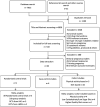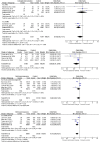Effectiveness of pre-pregnancy lifestyle in preventing gestational diabetes mellitus-a systematic review and meta-analysis of 257,876 pregnancies
- PMID: 37973902
- PMCID: PMC10654718
- DOI: 10.1038/s41387-023-00251-5
Effectiveness of pre-pregnancy lifestyle in preventing gestational diabetes mellitus-a systematic review and meta-analysis of 257,876 pregnancies
Abstract
Background: Gestational Diabetes Mellitus (GDM) is hyperglycaemia first detected during pregnancy. Globally, GDM affects around 1 in 6 live births (up to 1 in 4 in low- and middle-income countries- LMICs), thus, urgent measures are needed to prevent this public health threat.
Objective: To determine the effectiveness of pre-pregnancy lifestyle in preventing GDM.
Methods: We searched MEDLINE, Web of science, Embase and Cochrane central register of controlled trials. Randomized control trials (RCTs), case-control studies, and cohort studies that assessed the effect of pre-pregnancy lifestyle (diet and/or physical activity based) in preventing GDM were included. Random effects model was used to calculate odds ratio (OR) with 95% confidence interval. The Cochrane ROB-2 and the Newcastle-Ottawa Scale were used for assessing the risk of bias. The protocol was registered in PROSPERO (ID: CRD42020189574) RESULTS: Database search identified 7935 studies, of which 30 studies with 257,876 pregnancies were included. Meta-analysis of the RCTs (N = 5; n = 2471) in women who received pre-pregnancy lifestyle intervention showed non-significant reduction of the risk of developing GDM (OR 0.76, 95% CI: 0.50-1.17, p = 0.21). Meta-analysis of cohort studies showed that women who were physically active pre-pregnancy (N = 4; n = 23263), those who followed a low carbohydrate/low sugar diet (N = 4; n = 25739) and those women with higher quality diet scores were 29%, 14% and 28% less likely to develop GDM respectively (OR 0.71, 95% CI: 0.57, 0.88, p = 0.002, OR 0.86, 95% CI: 0.68, 1.09, p = 0.22 and OR 0.72, 95% CI 0.60-0.87, p = 0.0006).
Conclusion: This study highlights that some components of pre-pregnancy lifestyle interventions/exposures such as diet/physical activity-based preparation/counseling, intake of vegetables, fruits, low carbohydrate/low sugar diet, higher quality diet scores and high physical activity can reduce the risk of developing gestational diabetes. Evidence from RCTs globally and the number of studies in LMICs are limited, highlighting the need for carefully designed RCTs that combine the different aspects of the lifestyle and are personalized to achieve better clinical and cost effectiveness.
© 2023. The Author(s).
Conflict of interest statement
The authors declare no competing interests.
Figures



References
-
- WHO. Diagnostic Criteria and Classification of Hyperglycaemia First Detected in Pregnancy. 2013. https://apps.who.int/iris/bitstream/handle/10665/85975/WHO_NMH_MND_13.2_... (accessed 05.12. 2022). - PubMed
-
- International Diabetes Federation. IDF Diabetes Atlas teB, Belgium. IDF Diabetes Atlas, 10th edn. 2021. Available at: https://www.diabetesatlas.org (accessed 15.02. 2023).
Publication types
MeSH terms
Substances
Grants and funding
LinkOut - more resources
Full Text Sources

